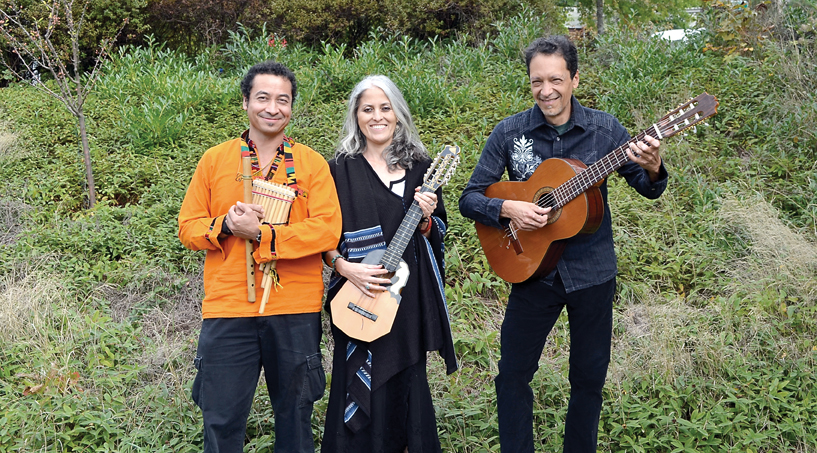PORT ANGELES — Latin musical group Sin Fronteras will perform live Saturday in a concert to benefit work to save mangroves around the world.
The concert by the group, whose name translates as “Without Borders,” will be at 7 p.m. in the third-floor ballroom of the Elks Naval Lodge, 131 E. First St.
It is presented by Northwest Heritage Resources in collaboration with the Mangrove Action Project and falls on International Migratory Bird Day.
Entry is by a requested donation of $10 to $15 at the door, although no one will be turned away for lack of funds. No tickets will be sold in advance.
A portion of the proceeds will benefit the Mangrove Action Project, a nonprofit organization working to restore the rapidly disappearing mangroves around the globe.
Traditional Latin music
The Seattle-area trio consists of performers of traditional Latin music who emigrated to the U.S. from Chile, Colombia and Mexico.
They describe their music as having “vibrant rhythms, soulful melodies and breathtaking harmonies — songs of life, humanity and love.”
The song lyrics are some of the most beautiful poetry in the Spanish language, said Alfredo Quarto, co-founder of the international Mangrove Action Project, which is headquartered in Port Angeles and includes offices in Thailand and Indonesia.
“They have a great set of music to play and traditional instruments from Latin America,” he said.
“The songs are almost a poetry of words that describe the situations of common folk.”
The trio performs in the style of nueva canción (“new song”) based on the rural folk music of Chile that spread to Argentina, Spain and other Latin countries, Quarto said.
First taking shape in the late 1950s and early 1960s, nueva canción began as a movement that contested the political dictatorships of the times, using folk music as an outlet to denounce political oppression, according to Smithsonian Folkways.
The music continues to be an avenue for advocating social change and conservation of natural resources.
The music makes extensive use of traditional musical forms and instruments — such as the quena, zampoña, charango and cajón — and features the guitar.
Sin Fronteras continues this tradition, adding the cuatro (a small guitar), Argentinian bombo (bass drum) and Venezuelan harp.
Mangrove project
Mangroves are salt-tolerant trees that are found worldwide in tropics and subtropic coastal regions, and are vital to migratory birds, marine life and adjacent communities, Quarto said.
Since 1980, a fifth of the world’s mangrove ecosystems has been lost, according to the World Atlas of Mangroves.
According to the United Nations, shrimp farming has resulted in the destruction of about 35 percent of the mangroves lost in the past 36 years.
Mangroves are cleared to make room for shrimp ponds used in commercial harvesting operations, Quarto said.
The Mangrove Action Project was founded in large part to address shrimp farming in largely unregulated Third World countries, Quarto said.
“Most of the mangroves that were destroyed in Asia and Latin America is because of shrimp farming, and shrimp consumption in the U.S. is a big issue,” he said.
“We are consuming more shrimp than ever. It is the No. 1 seafood.”
The Mangrove Action Project urges a reduction in the amount of shrimp consumed in America, especially shrimp imported from Asia and Latin America, Quarto said.
“We can reduce our consumption,” he said.
“Try to eat locally. . . . We are trying to get people not to eat imported shrimp because that is where a lot of the problem [exists].”
Birds affected
Millions of birds rely on mangroves for nesting grounds and as a food source, Quarto said.
“The migratory routes are vitally important for these birds, and mangroves play an important role in that,” he said.
“If mangrove forests are lost, we could lose whole species that migrate from South America to North America and from Africa to Asia. It is really important we protect those migratory routes.”
This concert is funded in part by the National Endowment for the Arts, 4Culture and Northwest Heritage Resources.
For more information about the concert, call 360-452-5866.
For more information about the Mangrove Action Project, visit www.mangroveactionproject.org.
________
Reporter Chris McDaniel can be reached at 360-452-2345, ext. 56650, or cmcdaniel@peninsuladailynews.com.

